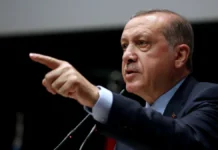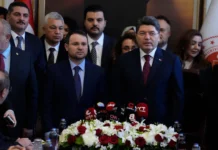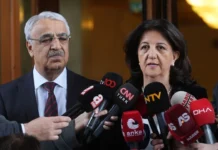Turkey is ranked 153rd among 180 countries in the 2021 World Press Freedom Index released by Reporters Without Borders (RSF) on April 17.
RSF said the Turkish government has used its military operations, the Syrian refugee crisis and the Covid-19 pandemic to “reinforce its authoritarian policies towards critical media.”
“Even if Turkey is no longer the world’s biggest jailer of journalists, the risk of imprisonment and the fear of being subjected to judicial control or stripped of one’s passport is ever-present,” RSF said.
Turkey has moved up only one place compared to last year’s index.
According to RSF, the government controls 90 percent of the Turkish media by means of regulators, while the Press Advertising Council, an agency allocates state advertising, and the Presidential Directorate for Communications, which issues press cards, “use clearly discriminatory practices in order to marginalise and criminalise the regime’s media critics.”
In response to a question by deputy chairperson of the main opposition Republican People’s Party (CHP) Gülizar Biçer Karaca, the presidential directorate said it refused to renew the press cards of 1,371 journalists and that 1,238 press cards were cancelled between December 14, 2018 and December 31, 2020.
Karaca asked the directorate about the journalists whose press cards were cancelled or not renewed following a change in regulations in 2018. A new regulation that resets the criteria for journalists to acquire press cards in Turkey was adopted in December 2018 in a move that disappointed and angered journalist organizations as it made the cancellation of press cards easier.
“In this ‘New Turkey’ marked by Recep Tayyip Erdogan’s hyper-presidency, one in which arbitrary decisions by magistrates and government agencies are the new normal, Internet censorship has reached unprecedented levels. Questioning the authorities and the privileged is now almost impossible,” RSF said.
According to RSF journalism is totally blocked or seriously impeded in 73 countries and constrained in 59 others, which together represent 73 percent of the countries evaluated by the organization.
The index data also revealed that the coronavirus pandemic has been used as grounds to block journalists’ access to information sources and reporting in the field. “… [J]ournalists are finding it increasingly hard to investigate and report sensitive stories, especially in Asia, the Middle East and Europe,” RSF said.
Amid declining press freedom in Turkey, a report drafted by CHP lawmaker Utku Çakırözer, also a former journalist, showed that nearly 100 journalists appeared before a judge in March and that six of those journalists were given prison sentences totaling 15 years, two months. Three journalists were detained, while investigations were launched into two others.
The Turkish government increased its crackdown on critical media outlets and journalists in the aftermath of a coup attempt in July 2016 following which dozens of journalists were jailed, while more than 200 media outlets were closed down under the pretext of an anti-coup fight.
According to the Stockholm Center for Freedom’s “Jailed and Wanted Journalists in Turkey” database, 174 journalists are behind bars in Turkey and 167 are wanted and either in exile or at large.















